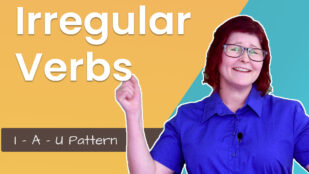Have you ever come across that most annoying of irregular verb patterns: I – A – U? It’s bad enough that verbs change their vowel once to make the past simple, but twice? That’s just cruel!
As we know, verbs in English have three forms: the base form (or infinitive without “to”), the past simple, and the past participle. Regular verbs in the past simple and past participle end in either -d, -ed or -ied when replacing a y. Most English verbs are regular verbs. But it’s the irregular verbs that give us the most trouble.
There are different types of irregular verbs. The type that we will talk about today are the group where the vowel changes in both the past tense and the past participle.
Find out how to conjugate these verbs and which verbs follow the pattern in my new video. The good news is that all these verbs follow the same pattern, so you just need to learn which verbs follow the pattern.
LET’S BEGIN
We’ll start with begin! Begin in the past simple is began and in the past participle, begun.
Examples:
– Let’s begin to learn about irregular verbs!
– Our lesson began a few minutes ago.
– You’re a bit late now, our lesson has begun!
The same rule applies to these other verbs.
Swim, swam, swum.
Examples:
– I swim because it’s good for my health.
– We swam in the pool on my birthday. (Pool party!)
– She has swum every morning since she was 10 years old.
Drink, drank, drunk
Examples:
– You drink cola every day.
– We drank a toast to the bride and groom.
– The tiger has drunk all the tea from the teapot.
(That is a sneaky reference to a well-known children’s book – parents, you may have read it to your children!)
Please note: The past participle drunk is not to be confused with the adjective drunk to describe someone who has had too much alcohol to drink, nor the noun to refer to someone who is regularly drunk or an alcoholic – that person might be unkindly called ‘a drunk’.
Also, Stink, stank, stunk
Examples:
– Rotten fruit makes the bin stink.
– We left the building because it stank of smoke.
– Don’t go in there! A skunk has stunk up the house!
(Stunk up is a phrasal verb we use to describe when a smell has filled an enclosed space.)
MORE EXAMPLES
Sing, sang, sung
Spring, sprang, sprung
Sink, sank, sunk
Shrink, shrank, shrunk
Ring, rang, rung
But be careful, because not all irregular verbs that have an ‘i’ follow this pattern.
Example:
Stick – meaning: to make two things fasten together.
The past simple is stuck, and the past participle is also stuck.
We don’t say, “I stack the broken toy back together with glue.”
Instead we say, “I stuck the broken toy back together with glue.”
“Stack” is a big pile of something (eg haystack -n) or to pile something up high! (stack the chairs – v)
Until next time!

 Ir
Ir